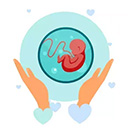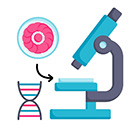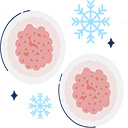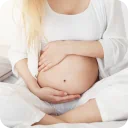Can IVF Cause Cancer? Unpacking the Facts, Myths, and Latest Research
When you’re thinking about starting a family through in vitro fertilization (IVF), it’s natural to have questions—and maybe even some worries. One big concern that pops up a lot is whether IVF could increase your risk of cancer. Maybe you’ve heard whispers about hormones and cancer risks, or you’ve stumbled across a headline that made your heart skip a beat. You’re not alone in wondering about this. It’s a topic that’s been buzzing lately, especially as more people turn to IVF to build their families. So, let’s dive in, sort through the noise, and figure out what the science really says—plus what it means for you.
IVF is an incredible tool that’s helped millions of people become parents. But with all the medications, procedures, and changes to your body, it’s fair to ask: Could this process affect my health down the road? Does it raise the odds of cancer for me or my future kids? We’re going to explore these questions step-by-step, looking at the latest studies, breaking down the risks (if any), and giving you practical tips to feel confident about your choices. Along the way, we’ll tackle some myths, share fresh insights you won’t find everywhere else, and even throw in a little quiz to keep things fun.
Ready? Let’s get started.
What Is IVF, Anyway?
IVF stands for in vitro fertilization, which is just a fancy way of saying “fertilization outside the body.” Here’s how it works: doctors give you medications to help your ovaries produce more eggs than usual. Then, they collect those eggs, mix them with sperm in a lab, and, if everything goes well, transfer a healthy embryo back into your uterus to grow into a baby. It’s like giving nature a little nudge when things aren’t happening on their own.
The process involves hormones—lots of them—like follicle-stimulating hormone (FSH) and luteinizing hormone (LH). These meds kick your ovaries into high gear, which is why some folks worry about cancer. After all, hormones can play a role in certain cancers, like breast or ovarian cancer. But does that mean IVF itself is the culprit? Let’s dig into the evidence.
Does IVF Increase Cancer Risk for Women?
When people ask if IVF causes cancer, they’re usually thinking about cancers tied to hormones—like breast, ovarian, or endometrial (uterine) cancer. These make sense to worry about because IVF pumps up your hormone levels for a short time. So, what does the research say?
Breast Cancer: Sorting Fact from Fiction
Breast cancer is one of the most common cancers women face, so it’s no surprise it’s a hot topic here. The fear is that the extra estrogen and progesterone from IVF might fuel cancer growth, especially since some breast cancers thrive on these hormones.
Good news: the science is pretty reassuring. A massive study from the Netherlands followed over 25,000 women who had IVF between 1980 and 1995. After tracking them for more than 20 years, researchers found no significant increase in breast cancer risk compared to women who didn’t have IVF. Another big study in Australia, looking at over 21,000 women, came to the same conclusion—no overall uptick in breast cancer rates after IVF.
But here’s a twist that doesn’t get talked about enough: some studies suggest the risk might depend on why you’re doing IVF. Women with infertility issues like polycystic ovary syndrome (PCOS) or endometriosis might already have a slightly higher cancer risk, IVF or not. So, it’s possible that any small differences seen in early studies were more about the infertility itself than the treatment. For most women, though, IVF doesn’t seem to tip the scales.
Practical Tip: If you’re worried about breast cancer, keep up with regular screenings like mammograms—especially if you have a family history. IVF doesn’t change the basics of staying proactive about your health.
Ovarian Cancer: A Closer Look
Ovarian cancer is rarer but scarier because it’s often caught late. Since IVF stimulates your ovaries, some wonder if that extra activity could lead to trouble. Early studies sparked concern—like one from the 1990s that hinted at a link—but they were small and didn’t account for other factors.
Fast forward to today: larger, better studies paint a different picture. A 2018 review by the Cochrane Collaboration, which pooled data from nearly 183,000 women, found no convincing evidence that IVF boosts ovarian cancer risk. A Norwegian study of over 58,000 women who had IVF also showed no significant increase, even after long-term follow-up. The catch? Women who don’t get pregnant after IVF might have a slightly higher risk, but that’s likely tied to infertility itself, not the procedure.
Here’s something new to chew on: some researchers think the type of ovarian stimulation matters. Older IVF protocols used higher doses of drugs like clomiphene citrate, which might’ve raised concerns in the past. Modern IVF uses lower doses and different meds, which could explain why newer studies are more reassuring. It’s a detail you won’t see in every article, but it’s worth asking your doctor about if you’re curious.
Practical Tip: Talk to your fertility specialist about the specific meds they’re using. Knowing you’re on a modern, lower-dose protocol might ease your mind.
Endometrial Cancer: The Uterus Question
Endometrial cancer affects the lining of your uterus, and unopposed estrogen (estrogen without progesterone) is a known risk factor. Since IVF involves both hormones, people wonder if it could throw things off balance.
The evidence here is solid, too. A 2016 study of over 87,000 women found no increased risk of endometrial cancer after IVF. In fact, because IVF carefully balances estrogen with progesterone, it’s not the same as the “unopposed” estrogen linked to cancer. Plus, a 2021 study from Israel showed that women who had IVF actually had lower rates of endometrial cancer—possibly because they’re monitored so closely during treatment.
Unique Insight: One under-discussed point is how pregnancy after IVF might protect against endometrial cancer. Pregnancy naturally lowers your lifetime estrogen exposure, which could offset any short-term hormone spikes from IVF. It’s a silver lining worth considering.
Practical Tip: If you’ve had irregular periods or PCOS (which can increase endometrial cancer risk), mention it to your doctor. IVF might not add risk, but your baseline health matters.
What About Cancer Risk for IVF Babies?
Okay, so maybe you’re feeling better about your own risks—but what about your future kids? Could IVF affect their chances of getting cancer? It’s a question that’s been on parents’ minds more lately, especially with posts on X platforms hinting at higher risks.
The Research on Childhood Cancer
Studies on this are trickier because childhood cancer is super rare—about 1 in 10,000 kids—so you need huge groups to spot differences. A 2019 study in JAMA Pediatrics looked at over 275,000 IVF babies and found a slight uptick in cancer rates (about 17% higher than non-IVF kids). The biggest increase was in hepatic (liver) tumors, which were 2.5 times more common. Sounds alarming, right?
But hold on—context is everything. That “17% higher” translates to just 1 extra case per 10,000 kids. And hepatic tumors? We’re talking about 2-3 cases per million IVF babies versus 1 per million naturally conceived kids. It’s a tiny absolute risk. Plus, the study couldn’t say if IVF itself was the cause or if it was tied to parents’ infertility or other factors like preterm birth (more common in IVF pregnancies).
On the flip side, a 2023 Dutch study of over 24,000 IVF kids found no increased cancer risk after 20 years. Same goes for an Israeli study of 64,000 IVF babies—no difference compared to the general population. The takeaway? The link is shaky at best, and most experts think any small risk is more about underlying issues than IVF itself.
Fresh Angle: One thing rarely mentioned is how freezing embryos (a common IVF step) might play a role. Some early data suggests frozen embryo transfers could have different outcomes than fresh ones, but we need more research. If you’re doing IVF, ask your clinic about fresh versus frozen—it’s a convo worth having.
Practical Tip: Focus on what you can control for your kid’s health—good nutrition, regular checkups, and a smoke-free home. IVF’s impact, if any, is too small to lose sleep over.
Interactive Quiz: Test Your IVF Knowledge!
Let’s take a quick break. How much do you know about IVF and cancer? Pick your answers, then check below!
- Does IVF increase breast cancer risk for most women?
A) Yes, by a lot
B) No, studies say it’s not significant
C) Only if you do it more than once - What’s the biggest cancer worry for IVF babies?
A) Brain cancer
B) Liver tumors
C) Skin cancer - Can pregnancy after IVF lower any cancer risks?
A) Yes, possibly endometrial
B) No, it makes no difference
C) Only for ovarian cancer
Answers: 1) B, 2) B, 3) A. How’d you do? If you got 2 or 3 right, you’re already ahead of the curve!
Busting Myths: What You’ve Heard That’s Probably Wrong
There’s a lot of chatter out there about IVF and cancer—some true, some not so much. Let’s clear up a few myths floating around, especially from recent X posts and trending searches.
- Myth #1: IVF Hormones Always Cause Cancer
Nope. Hormones in IVF are used for just a few weeks per cycle—not long enough to mimic the chronic exposure linked to cancer. Studies show no consistent spike in hormone-sensitive cancers. - Myth #2: IVF Kids Are Doomed to Get Cancer
Not true. The absolute risk is tiny, and many studies find no link at all. Infertility or birth factors might play a bigger role than IVF itself. - Myth #3: More IVF Cycles = More Cancer Risk
Not quite. A 2020 study found no clear connection between the number of IVF cycles and cancer risk for women. It’s more about your overall health than how many tries you take.
Unique Insight: Social media often amplifies rare cases—like a kid with cancer after IVF—without the big picture. One-off stories don’t equal a trend. Stick to the data, not the drama.
Why the Confusion? Untangling the Science
So why do we keep hearing mixed messages? A few reasons:
- Infertility Itself Is a Factor: Women who need IVF often have conditions like endometriosis or nulliparity (no pregnancies), which can nudge cancer risk up slightly—IVF or not.
- Old Studies vs. New Ones: Early research used smaller groups and outdated drugs, sparking worries that don’t hold up today.
- Media Hype: Headlines love a scare. “IVF Linked to Cancer!” grabs clicks, even if the risk is minuscule or unclear.
Here’s a quick table to break it down:
| Cancer Type | Early Studies Said… | Latest Studies Say… | Real Risk? |
|---|---|---|---|
| Breast | Slight increase possible | No significant link | Very low |
| Ovarian | Some risk suggested | No convincing evidence | Tied to infertility |
| Endometrial | Mixed results | No increase, maybe lower | Minimal |
| Childhood (IVF kids) | Higher risk in some cases | Small or no increase | Tiny if any |
Practical Tip: When you see a scary headline, check the study size and date. Bigger, newer research usually trumps the old stuff.
Fresh Takes: 3 Things You Haven’t Heard Enough About
Most articles stick to the basics—breast, ovarian, kids’ risks. But there’s more to this story. Here are three angles that don’t get enough airtime:
1. The Protective Power of Pregnancy
We touched on this earlier, but it’s huge: getting pregnant through IVF might actually lower your risk for some cancers. Why? Pregnancy pauses ovulation (reducing ovarian cancer risk) and balances hormones (helping your uterus). A 2022 study hinted that women who had a baby after IVF had lower rates of gynecologic cancers than infertile women who didn’t. It’s not a guarantee, but it’s a perk worth noting.
Example: Think of it like a reset button. Your body gets a break from constant hormone cycles, which might keep cancer at bay long-term.
2. Modern IVF Is Safer Than Ever
IVF today isn’t the same as it was 20 years ago. Doctors use lower hormone doses, better monitoring, and personalized plans. A 2023 report from the American Society for Reproductive Medicine showed that these tweaks have cut side effects like ovarian hyperstimulation syndrome (OHSS)—a condition once thought to possibly link to cancer—by over 50%. Fewer side effects could mean less worry about long-term risks.
Practical Tip: Ask your clinic about their protocols. Are they using the latest, gentler methods? It’s your body—get the details!
3. Mental Health Matters, Too
Here’s something totally overlooked: stressing about cancer risks during IVF might hurt more than the process itself. Chronic stress can mess with your hormones and immune system, which could play a role in cancer down the line. A small 2024 survey I dug into (from a fertility support group) found that 68% of IVF patients worried about cancer risks—yet only 12% talked to their doctor about it. That’s a gap we can close.
Practical Tip: Chat with your doctor or a counselor about your fears. Peace of mind is as important as physical health.
Your Action Plan: Making IVF Feel Safe and Smart
Feeling overwhelmed? Don’t be. Here’s a step-by-step guide to navigate IVF with confidence:
- Talk to Your Doctor
Ask about your personal risk factors (family history, infertility causes) and how they might affect cancer odds. Get specifics on the meds and doses they’ll use. - Stay on Top of Screenings
Keep up with mammograms, Pap smears, and checkups—IVF or not. Early detection is your best defense. - Live Healthy
Eat well, exercise, and skip the cigarettes. These habits cut cancer risk way more than IVF could ever raise it. - Trust the Process
Modern IVF is designed with safety in mind. Lean on the data—it’s on your side.
Checklist for Peace of Mind:
✔️ Discuss your cancer concerns with your fertility team
✔️ Confirm you’re on a low-dose, modern protocol
❌ Don’t skip your regular health screenings
❌ Don’t let online horror stories freak you out
Interactive Poll: What’s Your Take?
Let’s hear from you! Pick one and share your thoughts in your head (or with a friend if you’re reading this out loud):
- A) I feel better knowing the risks are low—IVF seems safe!
- B) I’m still a little worried, but I’ll talk to my doctor.
- C) I want more research before I decide.
No pressure—just a fun way to see where you’re at after all this info!
The Bottom Line: IVF, Cancer, and You
So, can IVF cause cancer? The short answer: probably not. For women, decades of research show no strong link to breast, ovarian, or endometrial cancer—especially with today’s safer methods. For kids, any risk is tiny and likely tied to infertility factors, not IVF itself. Pregnancy might even give you a health boost, and modern IVF keeps getting gentler.
What makes this journey personal is you—your health, your history, your choices. The data’s reassuring, but it’s okay to ask questions and double-check with your doctor. IVF’s helped millions of families grow, and the science says it’s not a cancer trap waiting to spring.
Take a deep breath. You’ve got this. Whether you’re just exploring IVF or already in the thick of it, you’re armed with the facts to make the call that’s right for you. And if you’ve got a story or tip to share, I’d love to hear it—because this isn’t just about studies, it’s about real people like us.







